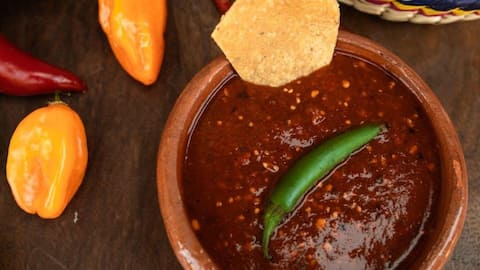Love spicy foods? It could be more psychological than physiological
What's the story
The love for spicy food could be more psychological than physiological, a recent observation suggests. The theory stems from the experiences of a person who has earned the nickname "Baby Spice" for their hatred of spicy food. The person often asks restaurant staff about the spiciness of dishes, getting assurances that the food isn't hot at all.
Experience
The struggle with spicy foods: A personal account
Despite the assurances of mildness, the poor soul often finds the meals too spicy to handle. The result? A lot of discomfort and a mad scramble for water. Naturally, this reaction amuses the people sitting with you who witness the struggle. In a bid to help, your family members suggest eating bread and even offer to swap meals. This experience is a reminder of how different people are when it comes to tolerance and preference for spicy foods.
Contrast
The love for spicy foods: A different perspective
On the other end of the spectrum, there are also many people who love spicy food, even going as far as looking for dishes with insane levels of heat. Some are thrilled by the challenge of eating white-hot food and pushing their stomachs to the limit. One such person boldly stated, "There's never been a spice I can't handle, bring it on," in stark contrast to those who avoid spicy food.
Research
Expectations shape sensory experiences: A new study
The varied reactions to spicy foods could be due to the way expectations influence sensory experiences, a new study found. Dr. Susan Albers, a clinical psychologist at the Cleveland Clinic in Ohio, who was not involved with the study, said "expectations are powerful." She added that these expectations can turn a burning sensation into either a pleasurable or unpleasant experience depending on the anticipated taste.
Experiment
The science behind spicy food preferences: A detailed study
The study, published in the journal PLOS Biology, was based on brain scans of 46 participants - 24 who liked spicy foods and 22 who did not. For the experiment, each participant was given squirts of mild and high-intensity hot sauce followed by water. They were shown two blue-colored peppers that gave no indication of the sauce's spiciness. This was repeated with color-coded peppers corresponding to the intensity of the hot sauce.
Results
Brain reactions to spicy foods: Study findings
The study found that the brains of those who enjoyed spicy foods lit up in areas associated with pleasure, especially when consuming hotter spices. On the other hand, the brains of those who disliked spicy foods showed activity in pain centers when hot sauce was administered. Interestingly, the experience of pain was significantly heightened during the second trial when participants were aware they'd be receiving the hottest sauce.
Insights
The power of negative expectations: Study insights
Lead author Yi Luo, an investigator in the school of psychology and cognitive science at East China Normal University in Shanghai, was surprised by how strongly negative expectations amplified the brain's pain response. Luo said the finding highlights how our anticipation of discomfort can greatly intensify the experience of pain. This means that our perception and expectation play a key role in our experience with spicy foods.
